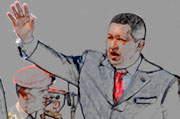
The inability of President Hugo Chávez to appear for his inauguration in Caracas last week has cast Venezuela into a constitutional limbo. Chávez was scheduled to be inaugurated to a fourth term on January 10th, after being re-elected on October 7, 2012, with 55 percent of the vote. But he could not attend because he is recovering from surgery in Cuba for an undisclosed form of cancer, which he has been battling since mid-2011.
The Venezuelan constitution, drafted in 1999 by an assembly dominated by Chávez supporters, did offer two potential solutions. First, the constitution allows for a temporary absence of the president to be filled by the appointed vice president for up to 6 months, at which point the National Assembly would decide if the absence should be declared permanent. The second was to declare a permanent absence right away; in this case, the constitution states that the office would have to be filled by the president of the National Assembly, who would then need to call elections in the following month.
However, neither of these two options was chosen by Venezuela’s constitutional court, the Supreme Tribunal of Justice, which instead declared that the inauguration of President Chávez and the beginning of a new presidential term could be postponed indefinitely, and that the current government could continue under a figure labeled as “administrative continuity.” This controversial ruling has thrown Venezuela into a constitutional limbo that is not just problematic from a legal point of view, but also potentially dangerous given the possibility of a renewed cycle of political polarization.
The ruling was not surprising, however. It fits with the gradual but sustained undermining of all constitutional checks and balances in Venezuela engineered by President Chávez and his majority since 1999. Apart from commanding a majority in the National Assembly, Chávez’s government controls the National Electoral Council and holds sway over the Supreme Tribunal of Justice. Given the uncertain conditions surrounding the health of the undisputed leader of the Bolivarian Revolution—his specific type of cancer and his current condition are both top state secrets in Venezuela as well as in Cuba, where he has been receiving treatment—the Chavista political movement is not willing to risk losing to the opposition, which had a revitalized showing in the October elections. Henrique Capriles Radonski won 44 percent of the vote as the candidate of the opposition coalition. Chavistas would rather suspend their own constitution indefinitely rather than risk going against the opposition in the absence of Chávez.
Apart from delaying an electoral contest against the opposition, the controversial decision by the Supreme Tribunal masks a deeper, more complicated issue for the Chavista majority: their own internal divisions and the fear that, in the absence of the overpowering presence of President Chávez, the yet-to-be-institutionalized movement may splinter into many different factions. Two splits are already evident; one is led by Vice-President, Nicólas Maduro, and the other led by Diosdado Cabello, President of the National Assembly. While Maduro represents the civilian, more radical-leftist faction of Chavismo, Cabello, an ex-army comrade of President Chávez, represents the military faction, which has closer ties to the new business sectors that have emerged under Chávez’s rule and also opposes Cuba’s unseemly influence over Venezuela’s internal affairs. By preventing Cabello from assuming power as president of the National Assembly, the Supreme Court gave the upper hand to Maduro this time around. Beyond that, however, the decision bought time for the Chavista majority to solve its inner conflicts and rethink their strategy going forward as they face the apparent imminent demise of their larger-than-life leader.
The opposition, meanwhile, has also been thrown off-track by the ruling from the Supreme Court. Despite a strong showing in the presidential elections of early October, they did not fare well during the regional elections in December. So they also have reasons to fear a premature contest against the government forces before they have time to regroup. However, the unconstitutional decision made by the tribunal to extend Chávez’s third term indefinitely and hand power to an unelected vice-president leaves them in a constitutional limbo where they could be permanently shut out of power. As a result, they have publicly denounced the ruling, both in street demonstrations and also before international organizations such as the Organization of American States (OAS) and the Inter-American Commission for Human Rights. They need to walk a very fine line between defending the constitution (with no allies in institutional high places) and being seen as profiting from the president’s ill health, a fact that Chávez supporters interpret as “treason.”
Vice-President Maduro has already responded to the opposition’s rejection of the tribunal’s decision with harsh words, and the war of words is escalating fast in this critical moment that will decide Venezuela’s future. In the absence of a credible third-party capable of solving this constitutional crisis, the danger of it moving from the courts into the streets and escalating into further violence is not a far-fetched possibility. The longer Venezuela’s constitutional limbo persists, the higher the danger that it may turn into a full-blown political crisis.
Ana Maria Bejarano is an associate professor in the department of political science at the University of Toronto Mississauga
Photo illustration of Hugo Chávez is based on a 2008 photo by Valter Campanato/Agencia Brasil.




